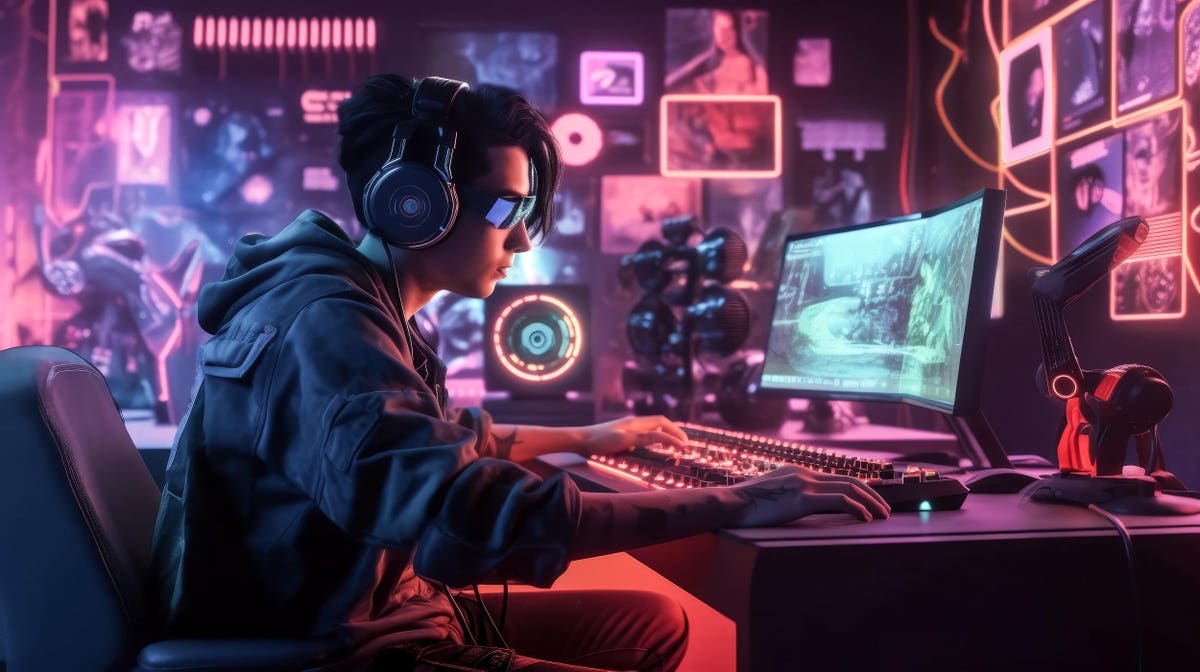Gaming today is already all about creating immersive worlds for players to enjoy, making it a natural fit with the metaverse — and gamers today can create real-world value from digital creations and NFTs.
What else is on the horizon for the world of gaming in the future internet? Let’s explore how the metaverse, web3, and new revenue models are redefining the gaming experience.
The Metaverse Is the Next Frontier in Gaming
Gaming has always been at the forefront of technological advancements, and the metaverse is no exception. As games evolve to become even more immersive, they are set to become integral components of the broader metaverse ecosystem.
According to a survey from Ernst and Young, 97% of gaming industry executives say gaming is at the center of the metaverse as it stands today.
In theory, any virtual reality (VR) game could be part of the metaverse. But remember: interconnectedness is at the heart of the metaverse. Players will need to be able to seamlessly transition between various games and experiences, bringing their digital identities, assets, and achievements with them.
To accomplish this level of interoperability, game developers will need to work together to create shared universes and cross-platform experiences.
In 2020, Epic Games CEO Tim Sweeney — whose company created the Fortnite gaming universe — explained his vision of gaming in the metaverse as:
“A move away from a whole bunch of walled gardens into something that’s increasingly open and comes to resemble, by the end of this decade, an open metaverse, in which players get together with their friends and they go from game experience to game experience, staying together as a group as friends, going across all platforms and not having to worry about what company made the device they’re on, or what company’s operating the servers they’re playing on as they go through these experiences.”
Fortnite is already a leader in the metaverse field. Their platform is an immersive world where gamers can enjoy entertainment experiences (like concerts) as well as play the game itself.
Augmented reality (AR) games that superimpose digital gaming elements on the real world are also still important. Pokémon Go was an important pioneer in this area, and we can expect to see more AR gaming as the technology continues to advance.
Using Web3 Tech to Decentralize Gaming
Web3 technology, powered by blockchain and decentralized protocols, is poised to revolutionize the gaming industry by empowering players with true digital ownership and control over their in-game assets.
Purchasing assets is already possible in many games, but in-game clothes, accessories, and other items are tied to individual games, not to players or avatars.
In the future internet, gamers will be able to trade, sell, or transfer their digital items across different platforms as NFTs by using web3 technologies. This will not only create a seamless experience for players, but it will also open up new revenue streams and support a thriving digital economy.
By leveraging blockchain technology, web3-enabled games can create transparent and secure systems for in-game transactions, ownership, and asset provenance. This decentralized approach eliminates the need for intermediaries and empowers players with greater control over their gaming experiences. Developers will also be empowered to create more engaging games by embracing player-driven economies and user-generated content.
Decentralized Autonomous Organizations (DAOs) have the potential to introduce new forms of governance, ownership, and community-driven development to the gaming industry. This will enable players to participate in the decision-making processes related to the direction, development, and updates of their favorite games.
Monetizing Gameplay with Play-to-Earn Models
Gaming is already becoming a profession, and that trend will continue as future internet technologies evolve.
As web3 technology gains momentum, we’re seeing the rise of play-to-earn (P2E) models, which enable players to monetize their in-game activities and achievements. P2E games reward players for completing tasks, battling other players, or progressing through levels. Those rewards are typically in-game tokens or assets in the form of NFTs that can be traded, sold, or redeemed for real-world value. This innovative approach is disrupting traditional gaming business models, making gameplay more rewarding and incentivizing player participation.
P2E models democratize gaming by providing earning opportunities for players, especially in regions where access to traditional financial systems is limited.
Axie Infinity is a popular P2E game based on blockchain technology. Players can earn rewards in Axie Infinity by breeding and selling digital pets called Axies, participating in battles, completing daily tasks and questions, and locking up AXS tokens in a wallet or smart contract.
Redefining the Gaming Experience
The future of gaming is undeniably exciting, as metaverse and web3 technologies usher in a new era of interconnected, immersive experiences. As these innovations continue to reshape the gaming landscape, we can expect to see an increasingly diverse and inclusive industry that offers enormous opportunities for players and developers alike.
Read more about these topics in my new book, The Future Internet: How the Metaverse, Web 3.0, and Blockchain Will Transform Business and Society. And don’t forget to subscribe to my newsletter and follow me on Twitter, LinkedIn, and YouTube for more on the future trends in business and technology.
Read the full article here





